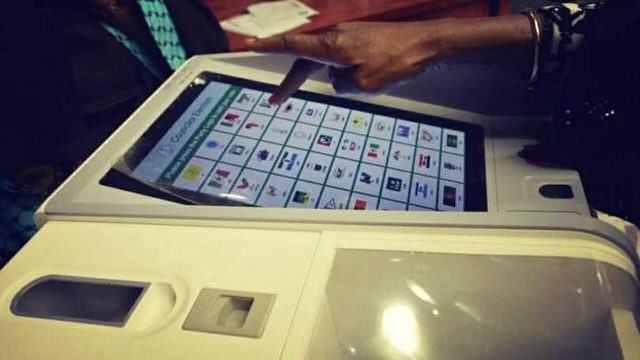The Independent National Electoral Commission (INEC), in its strongest defence of e-transmission of election results, says it has developed adequate structures and processes to successfully transmit election results electronically.
The News Agency of Nigeria (NAN) reports that the commission disclosed this in its “Position Paper No.1/2021 Electronic Transmission of Election” released on Saturday, in Abuja.
The commission stated that the available national infrastructures, including mobile network coverage were adequate to provide for electronic transmission of election results.
In the paper, INEC expressed its belief that electronic transmission of results would improve the quality of election results management, while its engagement with stakeholders had shown that the Nigerian public supported electronic transmission of election results.
“The technology and national infrastructure to support this are adequate.
“Consequently, if the choice was up to INEC, the commission prefers to transmit election results electronically once the necessary legal framework is provided,” it said.
The objectives of the position paper,
according to INEC, was to explain the desirability of electronic transmission of results as an electoral reform issue in Nigeria today, adding that it was also to clarify the position of INEC on some of the central issues around e-transmission of results.
“To build a consensus on electronic transmission of results as an electoral reform issue based on a shared understanding of its desirability towards the 2023 general election,” is also another reason, INEC explained.
The commission disclosed that for over a decade it had piloted the electronic transmission of election results via Short Messaging System (SMS) for off-cycle and bye-elections in 2011.
“The second system piloted for the 2011 General Election was called the e-Track.
The idea was to use handheld scanners to scan all polling unit results and send them as PDF files to a backend for processing and publishing.
“Unfortunately, the commission’s staff deployed for that purpose did not scan many of the results, while some of the scanned results were not legible.”
However, it noted that for the 2011 presidential results collation, INEC set up a system of transmitting state level results electronically to the national collation centre in Abuja, ahead of the arrival of the physical result, through a secured e-mail address that only the chairman of the Commission could access.
The paper stated that the innovation enabled the results to be ready for crosschecking against the physical result and to be displayed for public viewing during collation, which had brought a lot of transparency into the final collation of Presidential election results.
It added that since 2011, that had remained the procedure for collating Presidential election results at the National Collation Centre in Abuja and had since evolved into what is today called “The Collation Support and Result Verification System (CSRVS),” even though the manually collated results was still being use to declare results.
“Finally, for several off-season and by-elections conducted since the 2019 general election, the commission had begun to electronically publish images of polling unit results through its INEC Result Viewing (IReV) Portal.”
READ ALSO: “E-results Will Improve Quality Of Electoral Process” – INEC
Specifically, this system had been deployed in several major off-season/end-of-tenure and by-elections, including the Edo and Ondo state governorship elections, six senatorial and three Federal Constituency by-elections, 15 State constituencies and one councillorship constituency in the FCT, INEC said.
“From the results obtained from these elections, the commission is convinced that electronic results management will add great value to the transparency and credibility of elections in Nigeria“, it added.
While IReV was not electronic transmission of results, it noted, the portal had helped INEC to test three things that were central to electronic transmission of results, including the efficacy of electronic results management, should the legal encumbrance be lifted.
The position paper added that INEC had used the IReV portal to test the security of its systems and the capacity of the national infrastructure to support future electronic transmission of results.
“Since August 2020, the commission has conducted elections and transmitted election results from 20 States and the FCT, covering 27 constituencies spread across 84 LGAs, 925 Wards and 14,296 Polling units involving 9,884,910.
“The conclusion that the commission draws from these diverse pilots conducted since 2011 is that the country is ready for electronic transmission of results.
“The national ICT infrastructure is also adequate for the purpose of electronic transmission of results.
“This is underscored by all the discussions held with the Mobile Network Operators (MNOs) and the regulator, Nigerian Communications Commission (NCC), over the ten-year period of these pilots, but especially between 2018 and 2019.
“It is important to share the outcome of those discussions to underscore the commission’s conviction about the readiness of the country for electronic transmission of election results”, the commission added.
Over the years, the commission stated that it had established a longstanding partnership with both MNOs and NCC, with the discussion on electronic transmission of results.
Ahead of the 2019 general elections, in particular, INEC noted that the two commissions had established the INEC/NCC Joint technical committee on electronic transmission of election results, of which the final report was submitted on Aug. 9, 2018.
The report detailed the work and recommendations involving the major MNOs and the NCC as the regulator of telecommunications in Nigeria, profoundly convinced INEC that electronic transmission of election results was possible for the 2019 general elections.
Lamentably, the position paper added that this did not happen because INEC did not receive any legal backing for it, even though based on the report’s recommendations, INEC was convinced that Nigeria had the infrastructure to implement the electronic transmission of election results.
“The MNOs have the capacity to do so and network coverage across the country is adequate and secure.
“This position is substantiated by the 2018 position of the people who should know, namely the MNOs, who informed the Joint Committee that they had provided such services to other customers, including the NCC, which regulates telecommunications in Nigeria.
“This is particularly so because the joint technical committee submitted its report three years ago.
“With the massive developments that constantly take place in the telephony and data transmission sector, the capacity would have further improved since then.
“In other words, the capacity is even more reliable today than it was three years ago when the MNOs and the NCC certified that electronic transmission of election results was possible.
“The contrary positions are probably built on some misconceptions which must be addressed”, INEC argued.
The misconceptions, according to INEC, included the assumption that electronic transmission of election results was the same as electronic balloting or Internet voting, which was false.
It also faulted recent trending arguments by some politicians suggesting that the challenges experienced with the Smart Card Reader (SCR) during elections was an indication that INEC was not ready for e-transmission of results.
“There is no connection between any imagined issues with the SCR and electronic transmission of election results”, it said.
It added that an unusual impression had also been created that electronic transmission of election result was dependent on the type of generation of the mobile network, between G2 to G5, available at a location.
“To suggest that 2G cannot transmit election data is simply incorrect. In any case, the MNOs and the NCC were well aware that only 2G network existed in some places in the country when in 2018 they concluded that electronic transmission of results was possible.”
INEC also stated that while INEC needs a partnership with NCC to transmit election results electronically, it did not require its approval, as section 160 of the Constitution empowered INEC to “impose duties” on other federal government agencies in the discharge of its functions.
“Put simply, to require INEC to obtain attestation from NCC and approval of the National Assembly to implement electronic transmission of election results will amount to a breach of the Constitution.
“Indeed, INEC should rather impose the necessary duties on the NCC to ensure that the electronic transmission of election results is actualised.”
What INEC urgently required was a legal framework that enabled rather than inhibits electronic transmission of results specifically, and full electronic voting generally, it stated, while citing the three broad critical areas in amending the Electoral Act, including “provisions that enable the INEC to introduce relevant technologies at the right time”.
It also suggested that the Electoral Act should make for electronic accreditation of voters, based on biometric features, the basis for allowing voters to cast their ballots.
“The current situation whereby manual accreditation takes precedence over biometric accreditation via electronic means, undermines the full benefits of the application of technology to elections.
“Combined with IReV portal, which is already operational, electronic transmission will strengthen the openness of results management and make it possible for election officials to be held accountable for their actions, where necessary, the electoral umpire added.














